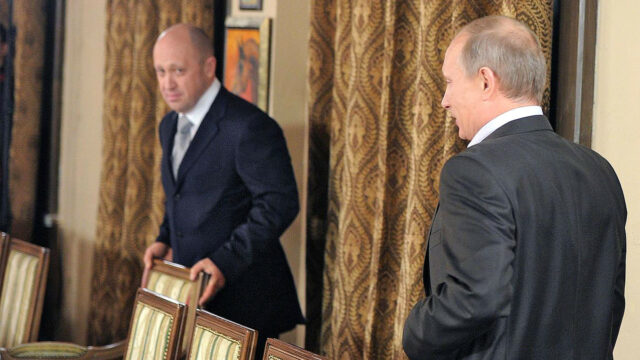
Going Beyond Mercenaries: Is Prigozhin Preparing for a Power Struggle in Russia? (Part Two)
Publication: Eurasia Daily Monitor Volume: 20 Issue: 50
By:

*Read Part One.
Russia’s full-scale war of aggression against Ukraine, launched on February 24, 2022, has elevated the public image and even popularity of the notorious Wagner Group and its sponsor Yevgeny Prigozhin in Russia. A combination of factors—a more sophisticated recruiting approach, an expanded geographic outreach and the attempted inclusion of ideology—suggest Prigozhin’s possible preparation for employing Wagner in a struggle for power in the case that Russia does indeed rupture and the collapse of its ruling elite becomes more visible (see EDM, March 22). Moreover, three additional aspects underline the Wagner founder’s mounting ambitious plans: a complex approach aimed at strengthening Wagner, building ties with representatives of economic and political circles, as well as political claims that seem odd on the surface but must be looked at through a different lens.
First, Prigozhin plans to introduce a key qualitative change to Wagner—that is, increasing its rank-and-file and adding more ideology to its structure. On March 18, he declared that by mid-May 2023, the Wagner Group should receive up to 30,000 new conscripts given its daily recruitment rate, which can reportedly reach up to 1,200 men (Lenta.ru, March 18). Furthermore, Prigozhin is determined to integrate an ideological aspect in his private military company (PMC), thereby transforming it into an army consisting of battle-hardened professionals with ideological allegiances to Prigozhin himself. In this, he shared his ideas about the fate of Wagner following the “seizure of Bakhmut.” The Wagner leader argued that, after this event, the PMC will go through a period of “reloading,” reflected in both a growth of personnel and its transformation into “an army with ideology,” which Prigozhin has characterized as the “pursuit of justice” (see EDM, March 22). He also dismissed the prospect that Moscow could easily disband Wagner, as any such attempt “would be answered in kind and met in the harshest way.”
In the same interview, Prigozhin de facto equalized the Wagner Group with the Russian nation, pointing to structural weaknesses in Russia’s existing state institutions. He stated that “[in Russia] minsters come and go, while the Russian nation [Russkii narod] stays. Wagner PMC consists of the Russian people.” Prigozhin also reiterated his previously emphasized thesis about Wagner’s indispensable strategic qualities, claiming that, should his mercenaries withdraw from the frontlines in Ukraine, this would allow the Ukrainian Armed Forces to overrun Russian positions and not only capture the whole of the so-called Luhansk “people’s republic” but also enter Russian territory (Focus.ua, March 5).
Second, Prigozhin is using his reported conflict with the Russian Ministry of Defense (MoD) over so-called “ammo hunger”—though, as noted by some Russian soldiers, Wagner forces are unlikely to experience major issues in this realm (Twitter.com/wartranslated, March 16)—to strengthen ties with other actors (from both political and business circles), thus intensifying the struggle for power in Russia. To this end, Prigozhin’s noteworthy interview on March 14 is quite eye-opening. In addition to directly blaming the MoD for artificially creating an ammunition shortage, Prigozhin indirectly accused Russia’s existing “power vertical”—through the example of the corrupt and inefficient Dmitry Rogozin—of weakness, indecisiveness and a grave lack of unprofessionalism. Without any further explanation, he suggested that, for Russia to succeed, some of the existing “bubbles” should be deflated (Riafan.ru, March 14).
Prigozhin’s conflict with the MoD seems to have unraveled another curious detail—specifically, the Wagner chief’s “circle” of allies and close figures he might rely on in a power struggle. Specifically, while harshly criticizing the MoD for sabotaging his efforts in Bakhmut, Prigozhin praised Denis Manturov (Russian minister of trade and industry) and Igor Nasenkov (CEO of Russian tech manufacturer Technodinamika) for their personal efforts in helping satisfy Wagner’s need for more ammunition and projectiles (Nation-news.ru, March 9).
Russian State Duma Chairman Vyacheslav Volodin is another key figure whose ties with Prigozhin may be strengthening. For the past several months, Volodin has been extremely vocal in his support for Russian “volunteers”—though it is unclear how independent this rhetoric has been—which has ultimately resulted in the adoption of the bill that envisages severe punishment for the “discrediting of volunteers participating in the special military operation.” From now on, the indicated “discrimination” will be punishable by up to 15 years in prison and 5 million rubles (about $65,000) in fines. The State Duma de facto adopted a bill that had been lobbied for by Prigozhin, who had asked Volodin (back in January 2023) to severely punish those Russian citizens who “are discrediting volunteers, including ex-convict and prisoners” (RBC, March 14).
In the same vein, it appears rather curious that some local governors and regional leaders are becoming more supportive of strengthening aspects of private military and security in Russia. Perhaps the most vocal of these has been the governor of Kursk Oblast, Roman Starovoyt, who was trained with Wagner (Gi-kursk.ru, January 8), as well as Chechen leader Ramzan Kadyrov, who has praised Prigozhin and Wagner on numerous occasions and vowed to create a private army of his own (T.me/gubernator_46, January 8; Meduza, February 19).
Third, despite its absurdity on the surface, Prigozhin’s recent statement regarding his intent to run for president in Ukraine in 2024 should not be dismissed entirely (RIA Novosti, March 11). Undoubtedly, this message is in no way directed at the Ukrainian public but rather is more aimed at Russian society itself. Given Prigozhin’s previously voiced initiatives—such as creating political forces personally subordinated to the Wagner leader (Novayagazeta.ru, February 16)—he might try to harness these resources to join a struggle for power in Russia down the road.
In conclusion, Prigozhin’s behavior and ambitions are by no means a direct corroboration of his autonomy or independence from the Kremlin. Even so, his inclusion in a struggle for power in Russia within the context of his wider political aims should not be ruled out.



